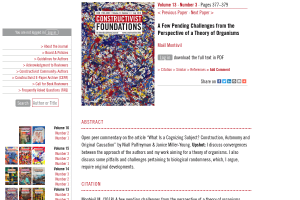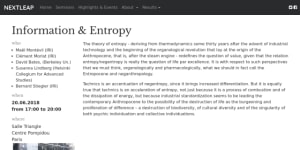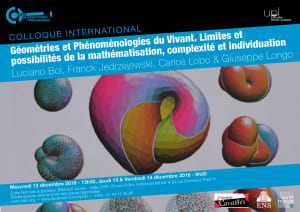
Archives of 2018
-

-
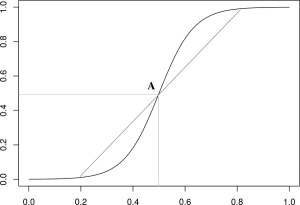
A primer on mathematical modeling in the study of organisms and their parts
Systems biology
How do mathematical models convey meaning? What is required to build a model? An introduction for biologists and philosophers.
Abstract
Mathematical modeling is a very powerful tool for understanding natural phenomena. Such a tool carries its own assumptions and should always be used critically. In this chapter, we highlight the key ingredients and steps of modeling and focus on their biological interpretation. In particular, we discuss the role of theoretical principles in writing models. We also highlight the meaning and interpretation of equations. The main aim of this chapter is to facilitate the interaction between biologists and mathematical modelers. We focus on the case of cell proliferation and motility in the context of multicellular organisms.
Keywords: Equations, Mathematical modeling, Parameters, Proliferation, Theory
Manuscript Citation Publisher Full textCitation
Montévil, Maël. 2018. “A Primer on Mathematical Modeling in the Study of Organisms and Their Parts.” In Systems Biology, edited by Mariano Bizzarri, 41–55. Methods in Molecular Biology. New York, NY: Springer New York. https://doi.org/10.1007/978-1-4939-7456-6_4 -
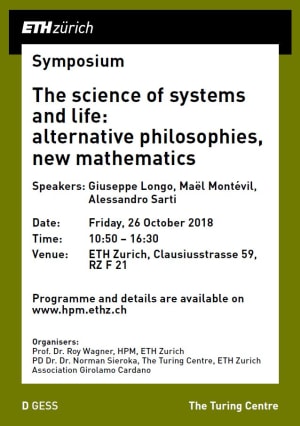
What is a new possibility in theoretical biology?
Biological evolution involves the appearance of new traits, new phenotypes and new processes but the mathematical understanding of such novelties is still lacking. In this paper, I argue that the notion of a new possibility should be and can be a fundamental notion in biology. This idea has been used in several models but it still lacks a proper mathematical, theoretical and epistemological framework. The notion of new possibility should be analyzed carefully since, like for the notion of probability, points of view a priori and a posteriori cannot be conflated. Moreover possibilities are virtual and it seems at first sight that adding possibilities by a retrospective theoretical move does not change the state of an object. In order to define precisely the notion of new possibilities, I will first discuss a positive notion of possibility which pertains to properties that are properly defined theoretically. This will lead us to a more precise discussion than the set-theoretic language to describe possibilities and enable us to define a robust notion of new possibilities.
-

Symposium: The science of systems and life: Alternative philosophies, new mathematics
We are a group of mathematicians who denounce a mathematization of the world oriented towards purely quantitative analyses and reductionism, rather than invention and construction of understanding. The prevailing use of mathematics as a search for “optimal paths” in economy, biology and general human activities supposes a pre-given universe of possibilities and is suitable for control more than for knowledge construction and a common action. Sometimes, researchers even claim that “computer programs” run organisms’ development and animal or human behavior.
We are instead interested in the historical emergence of meaning in changing spaces of possibilities as well as in the production of sense in science and in the personal activity of the researcher. Our current work focuses on historicity, organicity and contextuality of life; on the role of interpretation and meaning in the process of vision; on the importance of interpretation in the applications of mathematics and of a committed analysis of future projections in areas such as finance and ecology.
In 2017, we proposed the creation of the association Girolamo Cardano (1501- 1576: inventor of imaginary numbers, first thinker of the transformation of the living in time) that readers are invited to join: http://cardano.visions- des-sciences.eu -

The coding of life. Breakthroughs and blind spots in the mathematisation of the life sciences.
-
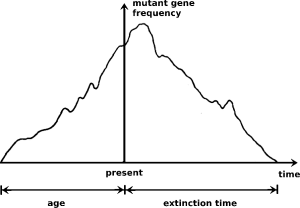
Répétition et réversibilité dans l’évolution : La génétique des populations théorique
Temps de la nature & nature du temps. Études philosophiques sur le temps dans les sciences naturelles
La génétique des populations théorique décrit-elle des phénomènes réversibles? Que veut dire réversibilité et quel lien avec la notion de répétition?
Abstract
La répétitivité et la réversibilité ont longtemps été considérées comme des traits caractéristiques de la connaissance scientifique. Dans la génétique des populations, la répétitivité est illustrée par un certain nombre d’équilibres réalisés dans des conditions spécifiques. Étant donné que ces équilibres sont maintenus en dépit du renouvellement des générations (réarrangement de gènes, reproduction ...), on peut légitimement dire que la génétique des populations révèle d’importantes propriétés d’invariance par transformation. La réversibilité est un sujet plus controversé. Ici, le parallèle avec la mécanique classique est beaucoup plus faible. La réversibilité est incontestable dans certains modèles stochastiques, mais au prix d’un concept probabiliste particulier de réversibilité. Par contre, elle ne semble pas être une propriété de la plupart des modèles déterministes classiques décrivant la dynamique des changements évolutifs au niveau des populations. Nous distinguons plusieurs sens de la « réversibilité ». En particulier, la symétrie par inversion du temps ne doit pas être confondue avec la rétrodiction.
Keywords: génétique des populations, répétition, rétrodiction, réversibilité
Manuscript Citation Publisher Full textCitation
Gayon, Jean, and Maël Montévil. 2018. “Répétition et Réversibilité Dans l’évolution : La Génétique Des Populations Théorique.” In Temps de La Nature & Nature Du Temps. Études Philosophiques Sur Le Temps Dans Les Sciences Naturelles, edited by Christophe Bouton and Philippe Huneman, 315–42. CNRS éditions. http://www.cnrseditions.fr/philosophie-et-histoire-des-idees/7678-temps-de-la-nature-nature-du-temps.html -
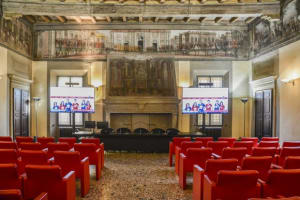
Secrecy, transparency and opacity in biology.
In biology, the molecular biology revolution lead to the prevalence of a linguistic metaphor in the second half of the twentieth century. This metaphor led to a double perspective on secrecy: biologists aimed to unravel the secrets of the living, which would be revealed by reading and decoding DNA, and the secrecy between researchers competing to decode the same "information". This framework is now outdated, both for the understanding of life and in social practice. Biology seems to hesitate between imposing transparency, on both its practices and its objects, and recognizing the existence of several opacities.
-
Approche théorique des organismes pour la médecine
Avec l’arrivée des algorithmes en médecine, il y a deux voies possibles. Certains pensent que l’on peut automatiser l’essentiel de la pratique médicale et dans ce cas le médecin deviendra subordonné à la machine. La médecine par la preuve ouvre déjà cette voie en standardisant la décision médicale, même si cette automatisation ne passe pas par une machine. L’alternative consiste à redonner une centralité à l’analyse du médecin et à subordonner l’automatisation et la modélisation à son regard critique.
La biologie théorique permet de trancher entre ces deux options et nous conduit à promouvoir la seconde. Pour le comprendre on peut introduire brièvement la question des normes biologiques. Avant la théorie de l’évolution, la théologie naturelle posait l’existence d’un ordre naturel dont les normes, statiques, étaient données par Dieu. À l’opposé, la théorie de l’évolution pose que les normes des organismes ne sont pas statiques et changent au cours du temps. Si l’on raisonne avec des normes fixes, comme dans le cadre de la théologie naturelle, les statistiques sont adéquates pour révéler les normes biologiques. À l’opposé, dans le cadre de l’évolution, le vivant se caractérise par la production de nouvelles normes qui demandent à être analysées dans leurs singularités. Alors, il semble bien que l’analyse statistique, y compris dans sa version sophistiquée sous forme d’IA, soit nécessairement incomplète pour l’analyse des organismes vivants et de la diversité de leurs organisations. Les statistiques ne peuvent donc pas remplacer le jugement du médecin confronté à un individu et ses particularités.
Cette brève discussion illustre le fait que l’utilisation rationnelle des moyens numériques ne saurait se passer d’une élaboration théorique en amont. Dans cette rencontre nous allons présenter ces idées et des méthodes pour appréhender les organisations biologiques dans leur complexité. -
La médecine au chevet de l’IA médicale : Nécessité d’un fondement théorique du vivant pour aborder les nouvelles technologies de manière rationnelle
Avec l’arrivée des algorithmes en médecine, il y a deux voies possibles. Certains pensent que l’on peut automatiser l’essentiel de la pratique médicale et dans ce cas le médecin deviendra subordonné à la machine. La médecine par la preuve ouvre déjà cette voie en standardisant la décision médicale, même si cette automatisation ne passe pas par une machine. L’alternative consiste à redonner une centralité à l’analyse du médecin et à subordonner l’automatisation et la modélisation à son regard critique.
-

Round table: Mathematics, life sciences, finance, work and economy
Nicholas Georgescu Rœgen and René Passet, as well as MIT, have emphasized that entropy and negentropy should be central to economic analysis. We will see that this requires us to consider anti-entropy as a dynamic factor, and to specify its role in a contributive economy, according to biology.
-

Entropy and the anthropocene
-
A few pending challenges from the perspective of a theory of organisms
Constructivist Foundations
I discuss convergences between the approach of N. Palfreyman and J. Miller-Young and my work aiming for a theory of organisms, in particular on randomness.
Abstract
Open peer commentary on the article “What Is a Cognizing Subject? Construction, Autonomy and Original Causation” by Niall Palfreyman & Janice Miller-Young. http://constructivist.info/13/3/362.palfreyman Upshot: I discuss convergences between the approach of the authors and my work aiming for a theory of organisms. I also discuss some pitfalls and challenges pertaining to biological randomness, which, I argue, require original developments.
Manuscript Citation Publisher Full textCitation
Montévil, Maël. 2018. “A Few Pending Challenges from the Perspective of a Theory of Organisms.” Constructivist Foundations 13 (3): 377–79. http://constructivist.info/13/3/377.montevil -
What first principles for mathematical modeling in biology?
By analogy with theoretical physics, theoretical biology is not limited to mathematical modeling. Instead, theoretical biology should strive to find suitable first principles to ground the understanding of biological phenomena and ultimately frame biological experiments and mathematical models. First principles in physics are discussed in terms of symmetries and the associated conservation principles, on the one side, and optimization on the other side.
In biology, we have argued instead that a strong notion of variation is fundamental. This notion encompasses new possibilities and is associated with the historicity of biological phenomena [3]. By contrast, the relative regularity of some aspects of biological organisms should be seen as the consequence of a mutual stabilization by the parts of organisms [2].
In this paper, we will focus on a last aspect which pertains to the way cellular behavior is framed theoretically: should cells of multicellular organisms be considered as spontaneously quiescent so that a stimulation would be required for them to move or proliferate, or should cells be considered as spontaneously moving and proliferating so that quiescence would be the result of constraints. We argue the latter and will show that this assumption can be used to build a model of epithelial morphogenesis in tissue culture. -
Entropy and functions
-
Les organisations biologiques entre interdépendances systémiques et historicité : Le cas des disruptions dues au changement climatique
-
Quels principes premiers pour comprendre la morphogenèse biologique?
When doing mathematical modeling, first principles are often interpreted as physical principles of conservation. In this paper, I show that properly biological first principles can also be introduced and used. Discussing this question can bring more coherence to the field and show that implicit, opposite assumptions are often made.
-

Le projet d’économie contributive à plaine commune
-
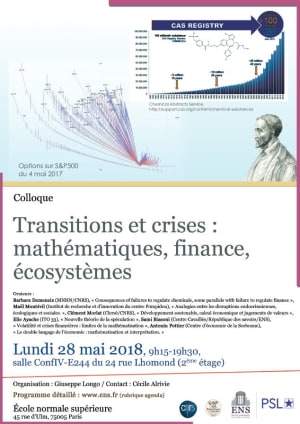
Analogies entre les disruptions endocrinniennes, écologiques et sociales.
-

Rencontre cardano: Transitions et crises : Mathématiques, finance, écosystèmes
Nous vous invitons à une seconde rencontre du groupe Cardano. Dans le contexte de l’anthropocène, il nous semble particulièrement utile d’interroger le rôle des mathématiques. Entre la toxicité propre aux produits chimiques non régulés et l’utilisation des mathématiques dans les marchés financiers, on réfléchira également au rôle de ces dernières pour appréhender la soutenabilité des transitions en cours.
-

Comparing symmetries in models and simulations
Springer handbook of model-based science
We distinguish mathematical modeling, computer implementations of these models and purely computational approaches by their symmetries and by randomness.
Abstract
Computer simulations brought remarkable novelties to knowledge construction. In this chapter, we first distinguish between mathematical modeling, computer implementations of these models and purely computational approaches. In all three cases, different answers are provided to the questions the observer may have concerning the processes under investigation. These differences will be highlighted by looking at the different theoretical symmetries of each frame. In the latter case, the peculiarities of agent-based or object oriented languages allow to discuss the role of phase spaces in mathematical analyses of physical versus biological dynamics. Symmetry breaking and randomness are finally correlated in the various contexts where they may be observed.
Keywords: Phase Space, Symmetry Breaking, Chaotic Dynamic, Object Oriented Programming, Genetically Modify Organism
Manuscript Citation Publisher Full textCitation
Longo, G., and Maël Montévil. 2018. “Comparing Symmetries in Models and Simulations.” In Springer Handbook of Model-Based Science, edited by M. Dorato, L. Magnani, and T. Bertolotti, 843–56. Springer International Publishing. https://doi.org/10.1007/978-3-319-30526-4





